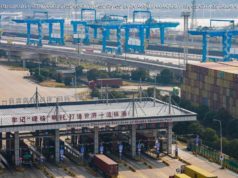JD.com chief Richard Liu sees drone delivery as a cost-effective way to reach consumers in the Chinese countryside.
Using robotics for parcel delivery could help to bring down costs and transform the logistics industry, according to the founder of China’s second-largest e-commerce player.
Speaking exclusively to CNBC, Richard Liu, founder and CEO of JD.com, said drone technology, in particular, could allow retailers like JD.com to offer delivery services in out-of-the-way locations, without incurring high logistics costs.
„Today we have over 70,000 delivery men working on the street. It’s high cost, you know, “ he said. „If you can use robotics to deliver a parcel, the cost will be very low.“
JD.com and rival Alibaba are already established players in China’s top-tier cities such as Beijing and Shanghai. But China’s rising middle class is opening newer markets for retailers in smaller cities and the countryside, where the infrastructure is not yet as well-developed as the bigger cities for cost-efficient ways of doing business.
„In the past, it’s very hard to do business in the countryside, because the logistic fee is very high, the cost is too high, “ said Liu. According to him, this is where drones, flown from the cities to the countryside, to deliver parcels, instead of cars or vans, could taper the cost.
„That kind of logistic fee will drop down at least 70 percent, so on our balance sheet, I think it will be profitable, “ he said.
Cost of global parcel delivery, which excludes pickup, line-haul, and sorting, already amounts to approximately 70 billion euros ($78.38 billion) according to a 2016 report from McKinsey & Co. China, along with Germany and the United States, accounted for more than 40 percent of the market, and e-commerce was the largest driver of growth.
The report added the last-mile delivery is often the costliest part in total parcel delivery costs, sometimes reaching more than 50 percent. It is at this juncture that consumers also judge retailers for their efficiency. As a way to differentiate themselves, many e-commerce companies now offer same-day delivery or instant delivery.
JD.com already has drones that can fly up to 100km per hour, delivering packages weighing from 5kg to 30kg, and is testing ones that can carry as much as 1,000kg. It started developing drone capabilities in 2015 via its JDX innovation lab. In June 2016, JD.com started trialing flights and is currently in operation, or being tested, in four provinces: Beijing, Sichuan, Shaanxi and Jiangsu.
Liu explained how drone delivery to China’s rural areas work: „In each village, we have a delivery man; he lives there and works there, and he’s got a backyard. He’s like a small distributor of us in that village. So we can use our drone to fly to the delivery man’s backyard directly. And point-to-point is fixed.“
He also addressed the perennial concern related to automation and robotics: what would become of JD.com’s large workforce? Most of them will still have a job, according to Liu.
„We still need a lot of humans to use the camera, to observe or control the drone, the delivery robotics, and the people-free warehouse, “ he said. „We still need a lot of workers to maintain or fix the whole system.“
„But if you look at the whole country, or the whole society, I think some people will lose their jobs, “ he added.
Liu expected technology to revolutionize the retailing industry within the next five year. And for the next decade, he believed technology would move faster than it did in the last century as certain technologies mature. „I think it will bring a lot of revolution, “ he said.
— Sam Meredith and Arjun Kharpal contributed to this report.






